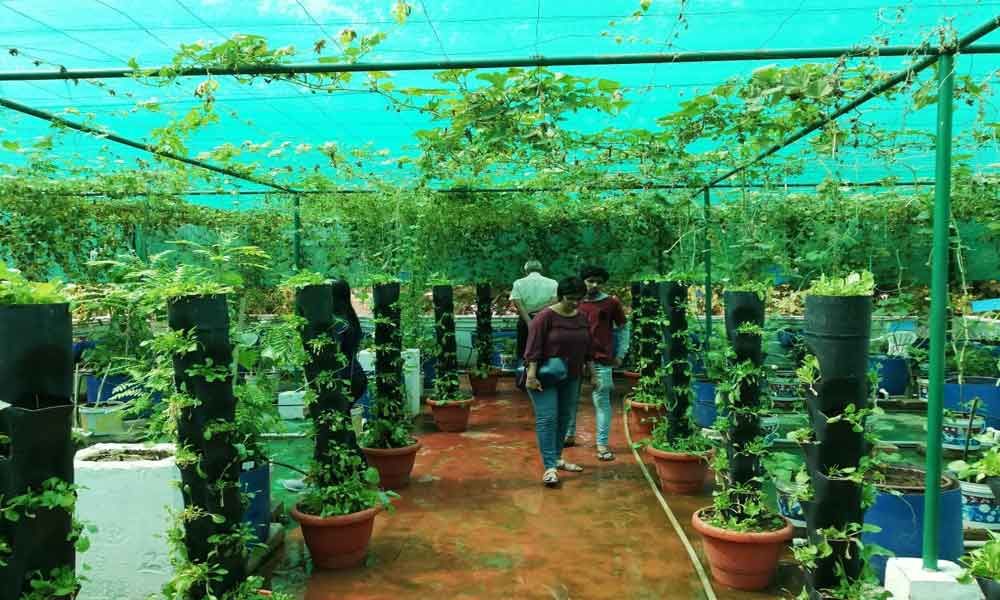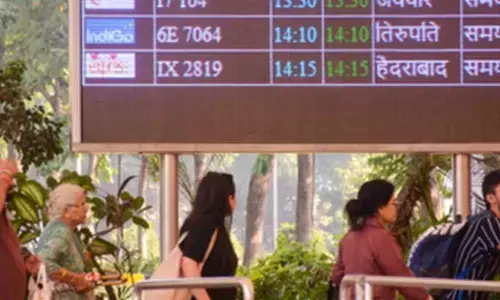Ryots on rooftops

Rooftop farming has become a viable choice for urban agriculture on account of decreasing agricultural land, especially in Indian cities. It has the potential to play a significant role in urban environment management and to improve the continuously deteriorating quality of air, while offering organic and fertilizer-free produce.
Hyderabad: Rooftop farming has become a viable choice for urban agriculture on account of decreasing agricultural land, especially in Indian cities. It has the potential to play a significant role in urban environment management and to improve the continuously deteriorating quality of air, while offering organic and fertilizer-free produce.
Growing local and organic food on rooftops has an additional benefit of helping improve nutrition and health. About 40% of adults consume fast food every day, according to the Centre for Disease Control. The growing fast food epidemic has been directly associated with increased rates of obesity, high blood pressure and heart disease.
All one needs for urban farming is space availability sunlight, water facility and leak-proof terrace.
City rooftop farmers
Eco-conscious and organic-friendly urbanites are acknowledging the importance of sustainable living as it is the need of the hour to sustain in the changing ecological conditions.
Pinnaka Padma and Srinivas, who reside at Deepti Srinagar Colony in Madinaguda, say they think of greenery even if there is a little space available.
"We grow 22 varieties of fruit, 18 varieties of vegetables and many kinds of flowers. We have managed to plant over 500 pots, in which we grow fruits and vegetables. Our garden spread across 850 square feet. Even with less space in our yard, I and my husband have managed to transform our passion for plants into an agricultural wonder and have inspired everyone in our neighbourhood and many urban farming lovers. Urban farming lovers across the city visit our garden to witness the agri-wonder with their own eyes," said Pinnaka Padma, an urban organic farmer.
The couple has managed to split their work in maintaining the garden. While Padma manages to water her 500 pots three times a day to keep them fresh and healthy, Srinivas keeps them away from insects and monkeys. They even have a 150-litre water drum, in case of any water shortage. No matter what circumstances the couple faces, they never fail to water their plants every day, along with maintaining them in a scientific manner, and using organic fertilizers in keeping them away from harmful chemicals.
Organic production is a necessity
Rooftop farming is fairly a new concept in India, but there is a progressive increase in the number of green roofs and rooftop farms, as organic produce became a necessity for better health.
"We support the existing networks of organic farmers in the urban areas, build up their capacity to regenerate and become successful in producing organic produce. Around 15,000 urban farmers are in the city. People strive for nutritious food, and the craving for organic food is increasing in the city. As per the demand, the production also has to see a rise in the quantity," says Samba Sivudu, founder of Mana Inti Pantalu.
"If we give health to people, people give us life. It's that we follow -- the policy of 'Sarvejana Sukhino Bhavanthu,' by providing a path for organic production," he said.
Organic food is affordable
The trend of organic farming is growing rapidly. The exorbitant price of organic products is expected to decrease overtime, as the trend of organic farming is rapidly spreading its roots to larger areas.
Hari Sowmithri, the founder of Sowmithri Gardens, who has a beautiful terrace garden, urges people to go organic to be healthy. Briefing on the reason for opting organic production, he said, in farming, fertilizers are mostly used to add macro-nutrients like nitrogen, potassium, and phosphorus to the soil, a major problem with the excessive use of these macro-nutrients is that of groundwater contamination.
The groundwater contamination has been observed as a cause of diseases like goiter, stomach cancer, gastric cancer, birth malformations and many more. "Pesticides and insecticides also cause many health problems. Keeping all this in mind, organic products seem like a healthier substitute for synthetics. They offer way more nutrients to the soil and help reduce the health risks associated with consuming chemically treated foods. So, now is the time to switch to organic," he said.
Vinay K Reddy, the founder of Ever Green Organics says, "It is very affordable to start with a little space for plantation, for two bags of leafy vegetables and a bag of potato and tomato cost less than the 5,000 Rs. We can start farming anywhere at whatever the place we have, including balcony. Once we start growing our own, we understand the value of organic food."
Hand-holding urban farmers
"We organise training programs at Telangana Horticulture Training Institute (THTI) on every second Saturday to sensitise the urban citizens on how to grow vegetable crops and their maintenance. Till date, some 7,600 beneficiaries are trained at THIT. Recently, field trips were also arranged for the trainees. Now, it is proposed to train 2,400 trainees for 2019-2020," said Madhusudhan, assistant director at THIT.
The Telangana government has introduced a scheme under the the Department of Horticulture, which provides seeds, seedlings, silpaulin covers, potting mixtures, neem cake, neem oil and implements with 50% subsidy, along with technical advice and guidance to grow vegetables in the balconies and terrace.
By Avinash Bhingarde& Vasavi Kaleru
WHAT CAN BE GROWN
- Leafy vegetables: Spinach, fenugreek, coriander, gongura, curry leaf, amaranthus and mint
- Root vegetables: Radish, carrot, potato, onion, yam, colocasia and beet root.
- Flower vegetables: Cauliflower, banana and cabbage
- Seed vegetables: Beans, peas and sweet corn
- Vegetables: Brinjal, tomato, bottle gourds, ridge gourds, bitter gourds, lady finger and cluster bean
- Fruits: Apple ber, custard apple and papaya




